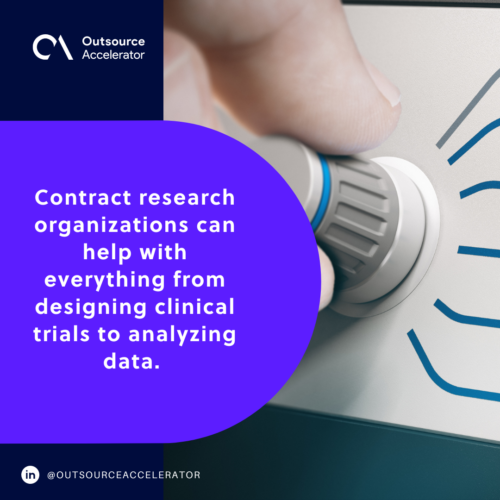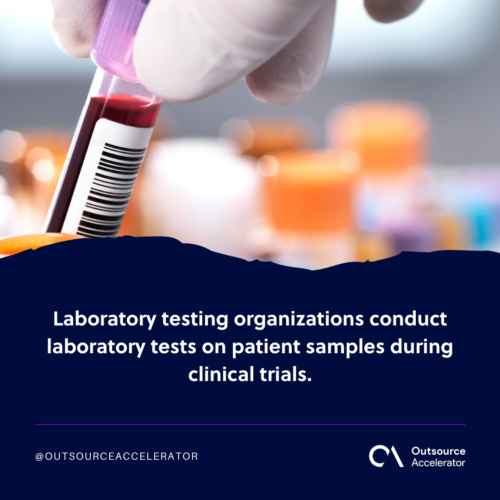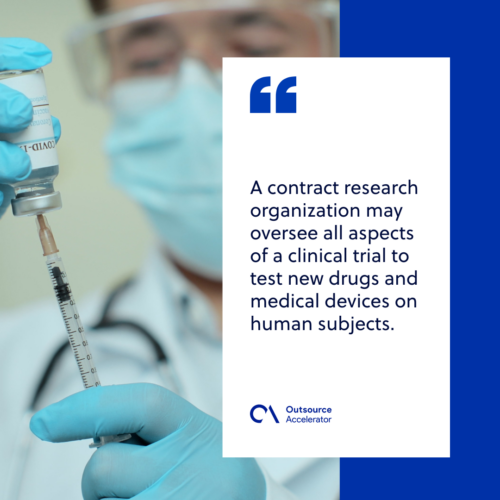Contract research organizations and their role in medical innovation

In the realm of scientific and medical research, contract research organizations (CROs) have emerged as vital allies in the pursuit of innovation and breakthroughs.
These specialized entities are pivotal in accelerating the development of new drugs, medical devices, and therapies by offering comprehensive research services and expertise.
As the demand for efficient and cost-effective solutions grows, understanding the role and benefits of CROs becomes essential. They are crucial to pharmaceutical companies, biotechnology firms, and academic institutions alike.
This article delves into the world of contract research organizations, exploring their functions, advantages, and key considerations to remember when collaborating with them.
What is a contract research organization (CRO)?
A contract research organization (CRO) is a company that provides assorted services primarily to pharmaceutical and medical device industries. These industries enlist the aid of CROs to help them navigate the complex process of developing new drugs and devices.
Contract research organizations can help with everything from designing clinical trials to analyzing data. They may provide all the necessary resources for a trial or only help with some aspects.
There are several general services that a contract research organization may provide. Many, however, specialize in a specific area, like clinical trial management or regulatory consulting.
Most contract research organizations have a hand in early-stage drug development. Pharmaceutical companies take over for the later stage phases, having greater resources and experience.
Contract research organizations may be located in any country where the appropriate regulatory approvals can be obtained for the kind of work involved. This has made outsourcing a common practice to reduce the costs of building up an internal staff.

Contract research organizations have many different types, but no actual set distinctions exist among them. What type of contract research organization is will mostly depend on its services.
Types of contract research organizations
Some contract research organizations may only focus on a single part of clinical development, while others may handle the entire process for you.
Still, here are some of the most common CROs you’ll find:
Clinical research organizations
These are contract research organizations that mainly design and conduct clinical trials to cater to pharmaceutical and biotechnology companies. Their services handle all aspects of clinical trials, from designing the protocol to conducting the study and writing up results.
They are also responsible for handling patients for clinical trials. This includes recruitment, taking care of their needs, monitoring their health, and analyzing their data.
Laboratory testing organizations
Laboratory testing organizations conduct laboratory tests on patient samples during clinical trials. This contract research organization also provides data on patient demographics and health status.
Laboratory testing organizations perform chemical and physical tests on products as well, like drugs, medications, or food. This is to ensure safety before being released into the market.
Regulatory affairs organizations
A regulatory affairs organization specializes in regulatory affairs and scientific support for the approval process. This contract research organization aims to ensure that a product meets all government regulations.
It can help develop strategies for approval, manage the application process, and coordinate interactions between the applicant and federal regulators.
Preclinical research organizations
Preclinical research organizations focus on aspects of animal testing. These include:
- Identifying the best model system for the drug or device being tested
- Designing experiments that will efficiently answer the study’s objectives
- Conducting animal experimentation
- Analyzing the results
This contract research organization will also frequently provide data management services to ensure that information is collected and properly stored throughout the study process.
Preclinical research organizations are typically used for early-stage drug development before human testing begins. Their work is done to evaluate the safety profiles of compounds before being tested on humans under controlled conditions.

Common services offered by a contract research organization
Here are the most common services that a contract research organization will offer:
Clinical trial planning
Clinical trial planning is an important part of the clinical research process. It involves a detailed review of the proposed clinical trial protocol and its feasibility to determine the following:
- Whether a clinical trial meets all regulatory requirements
- Whether a clinical trial can be conducted safely
- Whether a clinical trial is likely to produce reliable results
A contract research organization that produces well-planned clinical trials can also ensure that:
- The right questions are being asked
- Data collected can answer those questions
- They will provide useful information for researchers and clinicians
Clinical trial planning may also refer to determining what types of clinical trials and study designs are most appropriate for your product.
The ultimate goal is to verify if your product is safe and effective enough to warrant further development and commercialization.
Clinical data management
Clinical data management and reporting is the process of managing and analyzing critical data. This includes collecting, organizing, storing, and disseminating information.
This contract research organization service ensures that all information is:
- Accurate and complete
- Available and accessible when needed
- Protected from unauthorized access
Clinicians and researchers will need a way to retrieve data at any time. This process ensures that things are organized well so that it’s easy to find what is needed.
Clinical project management
Clinical project management is defined as the process of planning, organizing, and controlling clinical trials. A contract research organization may oversee all aspects of a clinical trial to test new drugs and medical devices on human subjects.
Clinical trials are very complex projects that involve multiple phases and numerous participants. They require careful planning and organization to ensure that all applicable regulations are followed and that all patients involved are treated with respect and care.
To conduct clinical project management, contract research organizations must deploy trained professionals who know how to follow proper protocol for human studies.
Clinical trial monitoring
Clinical trial monitoring is the process of collecting, analyzing, and reporting on clinical trial data. Clinical trials are typically conducted in phases to test different approaches or to determine whether a drug is safe enough to continue testing.
For this service, a contract research organization collects information about the health of participants during a clinical trial.
The information from clinical monitoring can be used to help researchers understand whether their treatment is working and if it can be approved for use on a wider scale.
Essentially, the process of clinical trial monitoring often involves:
- Ensuring that clinical trial participants are given the correct treatment at the right time and place
- Improving patient safety by closely monitoring patients who experience adverse events during the study
- Assisting with data collection, including patient follow-up, survey administration, and evaluation of laboratory results
Research compliance
Research compliance ensures that all research activities of a contract research organization are compliant with relevant laws and regulations.
Compliance can be both internal and external.
- Internal research compliance – It includes corporate policies, procedures, and guidelines.
- External research compliance – This involves regulatory requirements set forth on a federal, national, or international level.
Non-compliance has a long-term impact on a contract research organization’s reputation among investors, customers, and other stakeholders. These entities rely on trust between companies when it comes to handling sensitive data.
Research compliance can cover many aspects, including:
- Human subject protection – This is the ethical treatment of human participants in a research study. This includes consent forms, privacy protections, and International Review Board (IRB) reviews.
- Safety of research subjects – Participants must be protected from harm or injury during the course of an experiment or trial.
- Confidentiality – As a cornerstone of clinical research, confidentiality means that no information can be shared without prior authorization from those overseeing the trial.
Research education
Research education is one of the most popular services offered by contract research organizations.
A CRO can provide research education on current trends in medicine and treatment and new and upcoming therapies and medications in the market. It can also help medical professionals keep up with technological advancements so they can provide better care for their patients.
This service also involves providing customers with relevant information about clinical trials and answering questions.
Other services
Aside from the primary services listed above, a contract research organization may also perform any number of the following minor services:
- Medicine and disease coding
- Validation programming
- Product development planning
- Product commercialization
- Safety and efficiency summaries
- Quality reporting
- Biostatistics
- Statistical analysis reports
- Final study reports
- Medical writing

Choosing a contract research organization to work with
Consider the following qualities when seeking a contract research organization to outsource from:
Expertise and experience
A good contract research organization has the appropriate expertise and experience in different clinical research services to help you achieve your commercial goals.
A CRO with a track record of successful outcomes can provide you with information about the best way to design, conduct, and manage your processes.
It’s also important to work with a contract research organization that has experience in your medical area. That way, they’ll understand the challenges associated with each clinical development phase and help you avoid common pitfalls.
The best contract research organizations have had dealings with multiple specializations, including:
- Oncology
- Cardiology
- Neurology
- Immunology
- Respiratory disease
Quality and compliance
A reliable contract research organization will have a quality system in place that meets international standards. This includes regulatory compliance, quality and training for staff, and documented policies and procedures.
The CRO should have a thorough understanding of both the processes and the science behind its clinical developments. It also conducts these studies in accordance with all applicable laws and regulations, as well as maintaining strict data security policies.
Cost and value for money
A good contract research organization knows that cost is not the only factor to consider when evaluating its services. You must also consider value for money.
The best contract research organizations charge less but produce better results than other companies charging more.
The best way to ensure that you get the best value for money is by conducting thorough research and comparing quotes from different CROs before making a decision. Keep in mind that some CROs offer additional services, which may be useful depending on your needs.
A good contract research organization also provides a clear and transparent pricing structure with a detailed cost breakdown.
Communication and collaboration
Communication is the key to a successful CRO-client relationship. A contract research organization that can effectively communicate with its clients is more likely to be able to solve problems and meet deadlines.
This comes with a clear understanding of the goals of their clients, as well as their own responsibilities and timelines. This includes keeping clients informed of any changes in schedules or other issues that may affect the study design.
Collaboration with other hospitals and medical centers as well is particularly important. It ensures that studies are conducted according to ethical standards and using reliable clinical data-gathering methods.
Timeliness and flexibility
Finally, a capable contract research organization should be able to work with changing requirements by providing a flexible approach to customer needs.
It should be able to accommodate changes in project timelines without compromising budget or quality. If there are any delays, these should be communicated clearly so the client knows what’s going on.
Why should you partner with a contract research organization?
Why should you partner with a CRO? Let’s look at some of the top reasons:
- They have access to more resources than you do, not just for research but also for advanced medical devices.
- They have expertise in your area of interest.
- They have a deep understanding of the clinical trial process and can design it in a way that’s more likely to result in a successful clinical trial.
- They have access to clinical trial sites around the world.
- They are experienced in managing complex studies and protocols.
- They can manage all aspects of your study from start to finish. A contract research organization will ensure that everything is done correctly and efficiently.







 Independent
Independent




